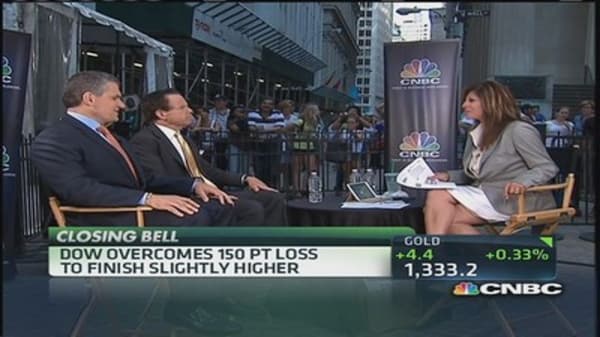M&A activity had been meandering along through 2013, with the global deal total at $1.25 trillion through the first half, about on pace with its 2012 total, according to Dealogic. Second-quarter activity was the lowest in four years.
However, the first half ended with a bang.
The two-month period following Bernanke's May 22 tapering comments saw a surge of deals, worth $164 billion. That was a 59 percent gain from the $102.8 billion total from March 20 through May 21, according to the S&P Capital IQ Global Markets group.
The blistering pace continued Monday, with three big deals announced:
Hudson Bay, which owns Lord & Taylor, said it is adding luxury retailer Saks to its stable, in a deal worth $2.4 billion.
Essilor International is buying a majority stake in lens supplier Transitions Optical from PPG Industries, in a cash dealamounting to about $1.73 billion.
And generic drugmaker Perrigo is buying competitor Elan for $8.6 billion.
(Read more: Ten bets from top hedge fund managers)
Hartnett said there are plenty of building blocks in place to bolster M&A growth through the end of the year, with interest rates unlikely to be a deterrent.
"When we look at the cash on the balance sheet of corporations, it's impressive. The fundamentals are there for a pretty robust M&A market," he said. "The capital markets have been very receptive to providing the financing necessary for M&A."
Nonfinancial corporations are carrying more than $1.8 trillion on their balance sheets, according to the latest Fed data.
In addition, while rates have jumped on a relative basis, they remain low.
(Read more: US is healing ... if the Fed doesn't screw it up)
Corporate heads who participated in a recent PwC survey expressed optimism, with 75 percent saying they have a bullish dealmaking view. Nearly half said they planned to put a deal together in 2013.
"A shortage of quality assets and a growing list of willing acquirers dictate a need for confidence and greater preparation to execute, from deal strategy through integration," Martyn Curragh, PwC's U.S. deals leader, said in a statement.
"Greater competition is driving valuations and deal timelines, leaving some would-be acquirers to reflect on missed opportunities, and others with buyers' remorse for failure to capture deal value," he added.
To be sure, the road ahead for M&A will have challenges.
(Read more: 10 Things You Need to Know About the First Half)
The slow pace in recent years has been not because of a lack of resources or good financing terms, but rather because of a lack of confidence and willingness of companies to part with cash amid economic and geopolitical turmoil.
Hartnett, though, said he expects pricing to become a much bigger factor than macro concerns.
The firm expects the best deals to be available in technology, health industries, financial services and the retail and consumer sector.
"From a pricing standpoint, there are fewer good assets, or those good assets are getting a lot of looks," Hartnett said. "That's creating a lot of value for sellers and businesses."
—By CNBC's Jeff Cox. Follow him @JeffCoxCNBCcom on Twitter.


.530x298.jpg?v=1374688398)


